November 01, 2022 | Vanessa McMains
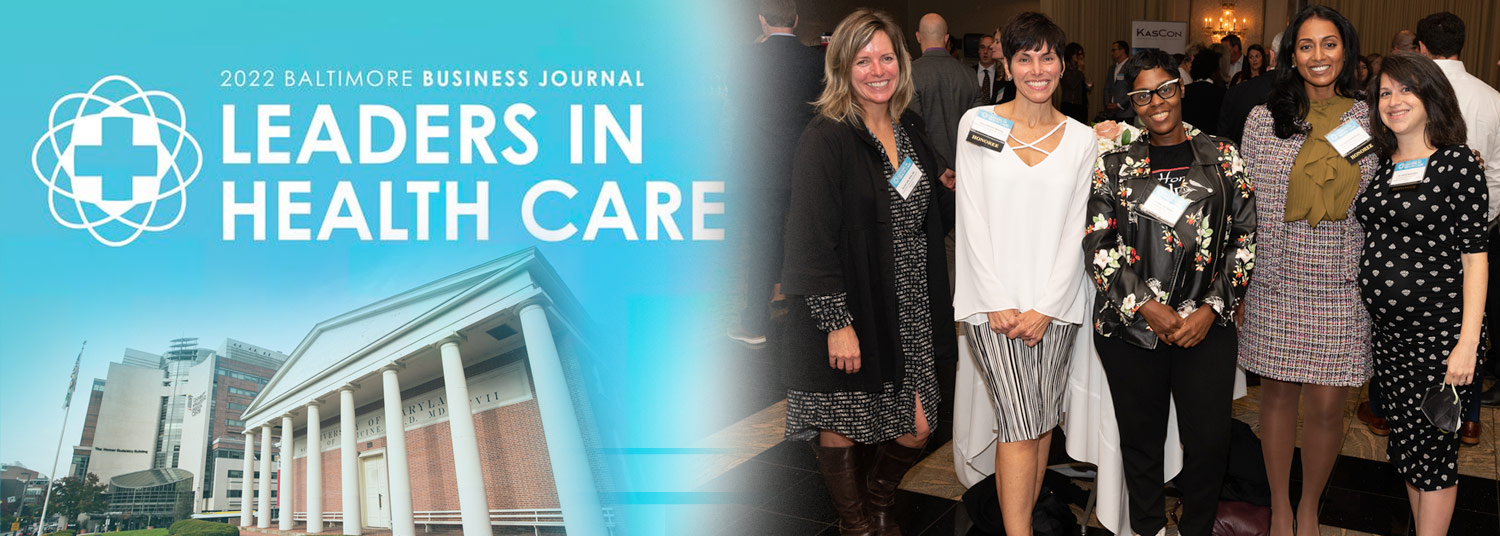
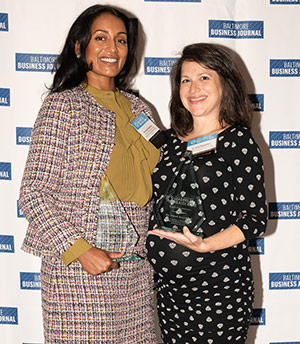
Sarah Kattakuzhy, MD, and Elana Rosenthal, MD, of UMSOM’s Institute of Human Virology (IHV), received Leaders in Health Care awards for their roles in spearheading a community outreach program for marginalized members of society. Drs. Kattakuzhy and Rosenthal also were dual honorees in the Health Care Outcomes category, which recognizes contributions made by those leading a coordinated effort to improve patient outcomes and community wellness.
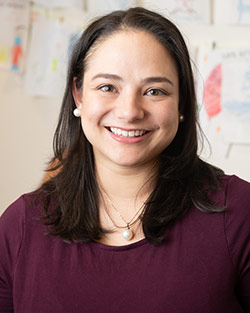 Adrianne Hammershaimb, MD, MS, of UMSOM’s Center for Vaccine Development and Global Health (CVD) and the Department of Pediatrics, was selected as a 40 Under 40 recipient after playing a key role in the Moderna and Novavax COVID-19 vaccine trials in Maryland and leading a study that informed the Center for Disease Control and Prevention’s (CDC) messaging on administering the vaccine to children.
Adrianne Hammershaimb, MD, MS, of UMSOM’s Center for Vaccine Development and Global Health (CVD) and the Department of Pediatrics, was selected as a 40 Under 40 recipient after playing a key role in the Moderna and Novavax COVID-19 vaccine trials in Maryland and leading a study that informed the Center for Disease Control and Prevention’s (CDC) messaging on administering the vaccine to children.
Drs. Kattakuzhy and Rosenthal were honored at the Baltimore Business Journal’s Leaders in Health Care event on Thursday, October 6, at Martin’s Valley Mansion in Cockeysville, MD, while Dr. Hammershaimb will be recognized at the 40 Under 40 event on Thursday, November 17 at the Marriott Owings Mills Metro Center in Owings Mills, MD.
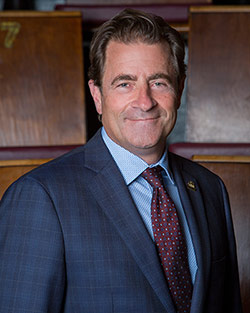 “These awards reflect the breadth of UMSOM’s reach from patient care in our local community to our research influencing nationwide policy guidelines for an international pandemic,” said Mark T. Gladwin, MD, Vice President for Medical Affairs at University of Maryland, Baltimore, and the John Z. and Akiko K. Bowers Distinguished Professor and Dean at UMSOM. “I could not be prouder of the work performed by our own clinician researchers in their quest to address several of the greatest generational challenges of our time.”
“These awards reflect the breadth of UMSOM’s reach from patient care in our local community to our research influencing nationwide policy guidelines for an international pandemic,” said Mark T. Gladwin, MD, Vice President for Medical Affairs at University of Maryland, Baltimore, and the John Z. and Akiko K. Bowers Distinguished Professor and Dean at UMSOM. “I could not be prouder of the work performed by our own clinician researchers in their quest to address several of the greatest generational challenges of our time.”
Drs. Kattakuzhy and Rosenthal hold leadership roles with the Research Initiative on Infectious Diseases and Substance Abuse (RIIS) program within UMSOM’s IHV. This program serves members of the community who typically slip through the healthcare cracks, including people who inject drugs, sex workers, transgender individuals, and people experiencing homelessness. RIIS’ primary purpose is to explore the intersection of infections and substance abuse in marginalized populations.
Dr. Kattakuzhy, an Associate Professor of Medicine and the Baltimore RIIS Director, and Dr. Rosenthal, an Assistant Professor of Medicine and the Washington, D.C. RIIS Director, have been involved with the program since 2014.
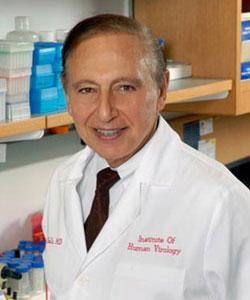 “My colleagues and I at UMSOM’s Institute of Human Virology are proud of Drs. Kattakuzhy and Rosenthal and their commitment to advance public health in our local communities,” said Robert C. Gallo, MD, the Homer & Martha Gudelsky Distinguished Professor in Medicine, Co-Founder and Director of the UMSOM’s Institute of Human Virology, and Co-Founder and Chair of the Scientific Leadership Board of the Global Virus Network (GVN). “Their success extends beyond our region and impacts the field of clinical research broadly.”
“My colleagues and I at UMSOM’s Institute of Human Virology are proud of Drs. Kattakuzhy and Rosenthal and their commitment to advance public health in our local communities,” said Robert C. Gallo, MD, the Homer & Martha Gudelsky Distinguished Professor in Medicine, Co-Founder and Director of the UMSOM’s Institute of Human Virology, and Co-Founder and Chair of the Scientific Leadership Board of the Global Virus Network (GVN). “Their success extends beyond our region and impacts the field of clinical research broadly.”
Led by Drs. Kattakuzhy and Rosenthal, the RIIS team provides on-site treatment for infectious diseases such as hepatitis C, HIV treatment and prevention, medications for opioid use disorder, and gender-affirming hormone therapy. Patients also can receive harm reduction services such as needle and syringe exchange, while engaging with providers who are non-judgmental and sympathetic. In addition to providing care in Greater Baltimore and Washington D.C., RIIS serves at-risk populations on the Eastern Shore via a mobile van.
While providing clinical care is a primary goal of the RIIS program, research is also an integral aspect of the initiative. Through clinical research, RIIS aims to understand and improve how care is delivered to marginalized populations. The team determines gaps in care, and then plans, implements, and evaluates delivery methods.
 RIIS also has made a positive impact through the program’s ability to adapt to the changing needs of the community. When many people lost access to their physicians at the onset of the COVID-19 pandemic in 2020, the program assisted those individuals in receiving routine care, including HIV medication, and gender-affirming hormone therapy for transgender individuals.
RIIS also has made a positive impact through the program’s ability to adapt to the changing needs of the community. When many people lost access to their physicians at the onset of the COVID-19 pandemic in 2020, the program assisted those individuals in receiving routine care, including HIV medication, and gender-affirming hormone therapy for transgender individuals.
“Drs. Kattakuzhy and Rosenthal well deserve this award. The business of health care is taking good care of patients, especially those who are marginalized. In this regard, they both have inspired us all through their leadership, compassion, and dedication to the most needed communities in Maryland,” said Shyam Kottilil, MBBS, PhD, Professor of Medicine at the UMSOM and Director of UMSOM’s Institute of Human Virology (IHV) Division of Clinical Care and Research.
Dr. Hammershaimb began her fellowship training at UMSOM shortly before the first cases of COVID-19 were diagnosed in Maryland. Dr. Hammershaimb diagnosed and reported some of the state’s earliest cases of Multisystem Inflammatory Syndrome in Children (MIS-C) – a disease in children related to COVID-19 – and quickly became a highly sought-after resource for the latest developments in prevention, testing, and treatment for COVID-19 in children and MIS-C. She helped implement hospital policies, while also educating medical students and pediatricians across the University of Maryland Medical System and in the community on the topics of COVID-19 in children and MIS-C.
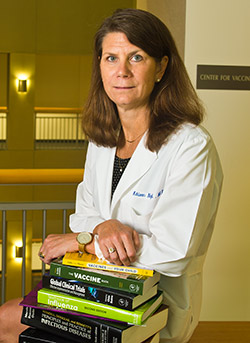 Additionally, Dr. Hammershaimb helped lead the Moderna and Novavax vaccine trials at UMSOM’s satellite site at CASA de Maryland in Prince George’s County, providing outreach to the Latinx community and ensuring that the trial was inclusive of Latinx Marylanders. This work was significant as the Hispanic community in Maryland has traditionally not been involved in clinical research and was disproportionately affected by the pandemic.
Additionally, Dr. Hammershaimb helped lead the Moderna and Novavax vaccine trials at UMSOM’s satellite site at CASA de Maryland in Prince George’s County, providing outreach to the Latinx community and ensuring that the trial was inclusive of Latinx Marylanders. This work was significant as the Hispanic community in Maryland has traditionally not been involved in clinical research and was disproportionately affected by the pandemic.
While providing key support to the vaccine trials, Dr. Hammershaimb simultaneously dove into research related to COVID-19 vaccine acceptance, work that caught the attention of the nation’s policymakers and public health leaders and was used in discussions of how to appropriately message the public on the topic. Earlier this year, Dr. Hammershaimb presented her work to the CDC Advisory Committee on Immunization Practices COVID-19 Working Group, which influenced how the organization disseminated information and recommendations to the public on the COVID-19 vaccine in children.
“At this early stage in her career, Dr. Hammershaimb has established herself as a superb physician-scientist and a tireless champion in the fight to control the COVID-19 pandemic,” said Kathleen M. Neuzil, MD, MPH, Director of CVD and the Myron M. Levine, MD, DTPH Professor in Vaccinology. “Her impact on public health has been exceptional. CVD is immensely proud of her contributions.”
About the Baltimore Business Journal
The Baltimore Business Journal is a trusted source of news and information for companies throughout the Greater Baltimore region. The online and print publication is part of American City Business Journals, the largest publisher of metropolitan business papers in the United States, with 46 markets.
About the University of Maryland School of Medicine
Now in its third century, the University of Maryland School of Medicine was chartered in 1807 as the first public medical school in the United States. It continues today as one of the fastest growing, top-tier biomedical research enterprises in the world – with 46 academic departments, centers, institutes, and programs, and a faculty of more than 3,000 physicians, scientists, and allied health professionals, including members of the National Academy of Medicine and the National Academy of Sciences, and a distinguished two-time winner of the Albert E. Lasker Award in Medical Research. With an operating budget of more than $1.3 billion, the School of Medicine works closely in partnership with the University of Maryland Medical Center and Medical System to provide research-intensive, academic, and clinically based care for nearly 2 million patients each year. The School of Medicine has nearly $600 million in extramural funding, with most of its academic departments highly ranked among all medical schools in the nation in research funding. As one of the seven professional schools that make up the University of Maryland, Baltimore campus, the School of Medicine has a total population of nearly 9,000 faculty and staff, including 2,500 students, trainees, residents, and fellows. The combined School of Medicine and Medical System (“University of Maryland Medicine”) has an annual budget of over $6 billion and an economic impact of nearly $20 billion on the state and local community. The School of Medicine, which ranks as the 8th highest among public medical schools in research productivity (according to the Association of American Medical Colleges profile) is an innovator in translational medicine, with 606 active patents and 52 start-up companies. In the latest U.S. News & World Report ranking of the Best Medical Schools, published in 2021, the UM School of Medicine is ranked #9 among the 92 public medical schools in the U.S., and in the top 15 percent (#27) of all 192 public and private U.S. medical schools. The School of Medicine works locally, nationally, and globally, with research and treatment facilities in 36 countries around the world. Visit medschool.umaryland.edu
About the Institute of Human Virology
Formed in 1996 as a partnership between the State of Maryland, the City of Baltimore, the University System of Maryland, and the University of Maryland Medical System, the IHV is an institute of the University of Maryland School of Medicine and is home to some of the most globally-recognized and world-renowned experts in all of virology. The IHV combines the disciplines of basic research, epidemiology, and clinical research in a concerted effort to speed the discovery of diagnostics and therapeutics for a wide variety of chronic and deadly viral and immune disorders, most notably HIV, the virus that causes AIDS. For more information, visit ihv.org and follow us on Twitter @IHVmaryland.
About the Center for Vaccine Development and Global Health
For over 40 years, researchers in the Center for Vaccine Development and Global Health have worked domestically and internationally to develop, test, and deploy vaccines to aid the world’s underserved populations. CVD is an academic enterprise engaged in the full range of infectious disease intervention from basic laboratory research through vaccine development, pre-clinical and clinical evaluation, large-scale pre-licensure field studies, and post-licensure assessments. CVD has worked to eliminate vaccine-preventable diseases. CVD has created and tested vaccines against cholera, typhoid fever, paratyphoid fever, non-typhoidal Salmonella disease, shigellosis (bacillary dysentery), Escherichia coli diarrhea, nosocomial pathogens, tularemia, influenza, malaria, and other infectious diseases. CVD’s research covers the broader goal of improving global health by conducting innovative, leading research in Baltimore and around the world. CVD researchers are developing new and improved ways to diagnose, prevent, treat, control, and eliminate diseases of global impact. Currently, these diseases include typhoid, Shigella, E. coli diarrhea, malaria, and other vaccine-preventable infectious diseases. CVD researchers have been involved in critical vaccine development for emerging pathogens such as Ebola and Zika. In addition, CVD’s work focuses on the ever-growing challenge of antimicrobial resistance.
Contact
Vanessa McMains
Director, Media & Public Affairs
University of Maryland School of Medicine
Institute of Human Virology
vmcmains@ihv.umaryland.edu
Cell: 443-875-6099
Related stories
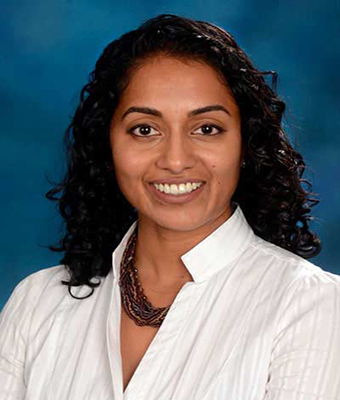
Monday, December 11, 2023
UM School of Medicine Awarded Nearly $30 Million to Prevent Infections Associated with IV Drug Use
The University of Maryland School of Medicine (UMSOM) has received $8.7 million from the National Institutes of Health to lead a multicenter trial that aims to improve health outcomes in people who inject opioid drugs and are hospitalized with infectious complications of their drug use.
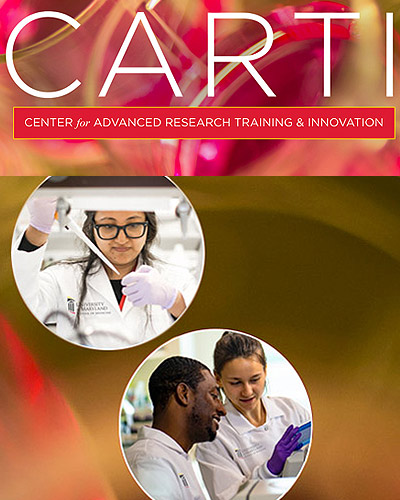
Monday, February 14, 2022
UM School of Medicine Launches Major New Center Focused on Advanced Research Training and Innovation
University of Maryland, Baltimore (UMB) President Bruce Jarrell, MD, announced today the official launch of an innovative new University of Maryland School of Medicine (UMSOM) Center that will focus on inspiring, growing and developing the next generation of clinician-scientists and biomedical research-scientists who will advance high-impact research and discovery.
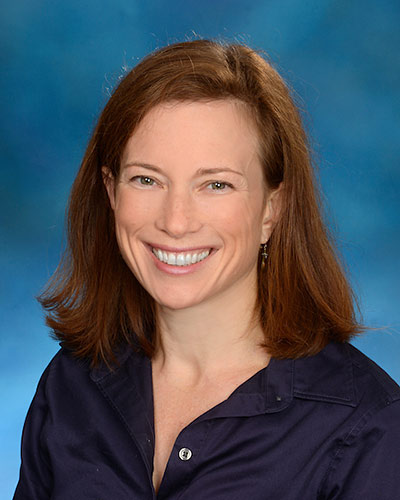
Wednesday, August 05, 2020
UMSOM Acclaimed Physician-Scientist and Student Mentor, Dr. Miriam Laufer, to Join Academic Affairs Leadership Team as Assistant Dean for Medical Student Research Education
University of Maryland School of Medicine (UMSOM) Vice Dean for Academic Affairs, James Kaper, PhD, along with UMSOM Dean E. Albert Reece, MD, PhD, MBA, announced that Miriam Laufer, MD, MPH, Professor of Pediatrics and Associate Director of the Center for Vaccine Development and Global Health (CVD), will join the Academic Affairs leadership team as Assistant Dean for Medical Student Research Education.
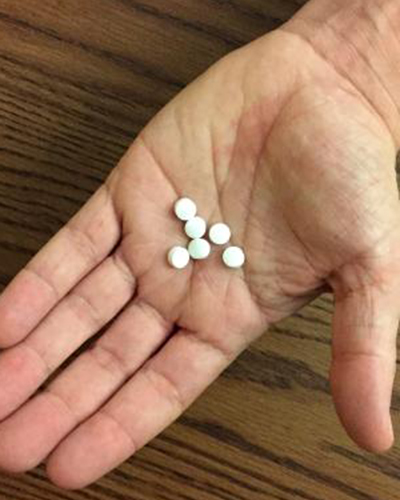
Thursday, March 21, 2019
IHV Experts Researching Experimental Drug to Curb Opioid Cravings
Researchers at the University of Maryland School of Medicine (UMSOM) Institute of Human Virology (IHV) are collaborating with scientists at the National Institutes of Health to test an experimental drug to curb opioid cravings.
